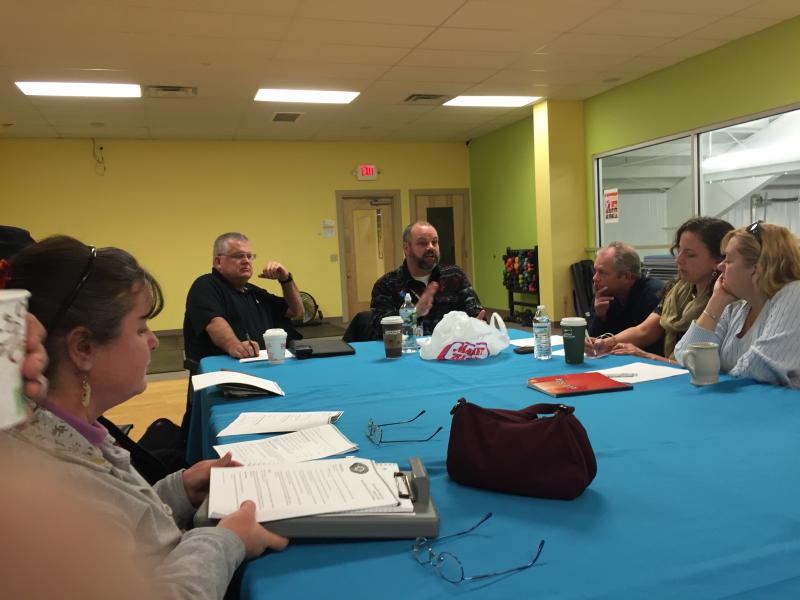Angels in training
A three-hour training session for “angels” met at the CLC YMCA on Monday, March 7.
The group of 19 people came to learn how to be of service to people who are suffering from opiate addiction who want a chance to become clean and sober.
The program is modeled after the Scarborough Operation Hope, which in turn was modeled after a successful program in Gloucester, Massachusetts. The training session occurred on the same day that Attorney General Janet Mills released some sobering statistics. In Maine, 272 died of opiate overdoses in 2015, a 31-percent jump from 2014.
The 2014 figure, 208 deaths, was also a record high.
In 2015, 157 deaths were caused by heroin and/or non-pharmaceutical fentanyl and 111 were caused by pharmaceutical opioids. Overdose deaths in 2015 caused by illicit drugs exceeded overdose deaths due to pharmaceutical opioids for the first time, even though the number of deaths caused by pharmaceutical opioids increased slightly as well. Nearly all deaths were in combination with other intoxicants, according to the Maine Department of Justice.
The 19 people who gathered to learn what they themselves could do about the numbers came from many walks of life. Some had lost relatives or friends. Others were on the road to recovery themselves and were looking for a way to give back. Still others were in the health care community. Some were just appalled by the deaths of so many young people, and wanted to do something to help.
The training was run by Steve Cotreau, who worked with Officer John Gill of the Scarborough Police Department. The program is run through the police department, and angels are called when someone comes to the police department looking for help with opiate addiction.
Not everyone is qualified to enter the program. For instance, people with active warrants cannot be placed, since many of the states to which they are sent have policies that allow them to be extradited. Maine does not, but there are few programs willing to accept “scholarship” patients in Maine; indeed, there are few programs in Maine at all.
Other disqualifiers include criminal backgrounds that include sexual offenses against children, or violent sexual offenses, or violent crimes in general, such as murder or aggravated assault. This is because it is simply impossible to find a location for one of these felons, not because the program doesn’t want to help.
People waiting for trial on bond, or those on probation, also don’t often qualify since they have to be transported to and from the mostly out-of-state sites. And those who have any other resources available, such as Medicaid, which can only be used in state, or an open child protection case in which the Department of Health and Human Services is required to pay for treatment as part of a family reunification plan, are advised to use those resources. The scholarship beds need to be saved for those with no other means of getting help, and for those who can stay for the entire duration, sometimes 90 days.
When someone comes to the police department, the angels are paged. If one is free, one responds with an estimated time of arrival. “Always say you are going to be later than you think you are going to be,” advised Cotreau. “These people are crawling the walls, waiting, and if you’re not there when you said you’re going to be there, they might leave.”
Those suffering from addiction are drug-sick, perhaps going through the early stages of withdrawal. The police department makes them as comfortable as possible, giving them snacks, drinks, and other comfort items — pillows or blankets, perhaps.
When the angel arrives, he or she completes an intake form, and makes a judgement call about the person’s readiness. Not everyone is ready to make such a change to their lives. “People who have private insurance or even Medicaid, we’ll try to get them into treatment anyway,” Cotreau said. “Those people are being paid to deal with their resistance. But those who are getting scholarship beds need to be ready, because the treatment centers won’t deal with them. And you don’t want to burn any bridges.”
By that, he meant that sending someone to a free treatment, which might cost as much as $20,000, if they are not going to complete the program, could lead to the center refusing to take any more of the angels’ clients. With free scholarship beds in short supply, that is not something the angels can do.
Maine Sen. Chris Johnson (D-Somerville), is instrumental in trying to get Lincoln County Hope up and running. He is currently seeking federal assistance for costs associated with getting the program up and running in Lincoln County.
“We can’t pay for treatment, we’ll never be able to afford to do that,” he said. “But like Scarborough, we might need funding to pay for transportation to and from the program sites, and we’ll need someone to be a part-time program manager,” he said. Some of the duties would include writing grants and finding places to send the clients.
“We have problems in our communities in getting federal help,” Johnson acknowledged. “One of the things they are always looking for is diversity, and we just don’t have a great deal of diversity in Maine.”
Operation Hope does not have any funding mechanism itself, as it is a functioning part of the police department in Scarborough. But a small nonprofit called “Operation Grace” was established to act as a fiduciary agent for Operation Hope.
Event Date
Address
United States
























